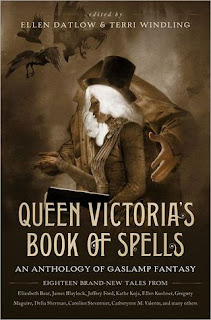The title: Queen Victoria's Book of Spells: An Anthology of Gaslamp Fantasy
The author: Ellen Datlow and Terri Windling (editors)
Publication: Tor Books, 2013
Got it from: The library
"Gaslamp fantasy," as the introduction to this book explains, is a work of fantasy set at any time during the era of gaslamps (primarily the nineteenth century). The idea immediately conjures up steampunk, although that is just one subgenre of gaslamp. (Incidentally, only one of the short stories in this anthology is what I would call steampunk: "Their Monstrous Minds," a Frankenstein retelling by Tanith Lee.) The stories in this collection are all over the place: some deal with Queen Victoria, others with subjects like the Great Exhibition, the Pre-Raphaelite Brotherhood, Dickens, the cholera epidemic and spiritualism. All the stories have some aspect of the fantastic.
As with any collection of short stories, I enjoyed some more than others. The most lighthearted is the title story by Delia Sherman, in which a modern-day scholar discovers that Queen Victoria may have used magic for her own selfish ends. "The Unwanted Women of Surrey" by Kaaron Warren highlights the vulnerability of women who were considered mentally ill in the Victorian era, set amidst the Broad Street cholera outbreak of 1854 (an event I've been interested in since reading Steven Johnson's fascinating book The Ghost Map.) "Estella Saves the Village" by Theodora Goss is a fun story of Victorian literature lovers as it imagines a village inhabited by characters from Great Expectations, Middlemarch, Jane Eyre and Sherlock Holmes, etc and in which Estella must solve a mystery a la Flavia de Luce. The real reason I picked up this book was for Ellen Kushner and Caroline Stevermer's "The Vital Importance of the Superficial." Fans of Sorcery & Cecelia will not be disappointed by this laugh-out-loud story told in letters.
But if I remember one story above all others, it will be James P. Blaylock's fascinating and eerie"Smithfield." In it, Arthur Conan Doyle is photographing a street on London on the last night before it gets electricity. It's a brilliant meditation on what we lose with progress. With perpetual daylight, have we lost the ghosts of the past? It perfectly encapsulates what I find fascinating about the nineteenth century, which I consider the key turning point in history, where the old world meets the modern one. At the end of the story Blaylock states, "I'm not at all fond of the idea that the world as I've come to know it is passing away." Any thoughtful person would agree.

No comments:
Post a Comment